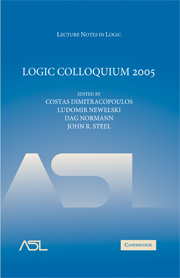Book contents
- Frontmatter
- Contents
- Introduction
- Speakers and Titles
- Thread algebra and risk assessment services
- Covering definable manifolds by open definable subsets
- Isomorphisms and definable relations on computable models
- Independence for types in algebraically closed valued fields
- Simple groups of finite Morley rank
- Towards a logic of type-free modality and truth
- Structural analysis of Aronszajn trees
- Proof analysis in non-classical logics
- Paul Bernays' later philosophy of mathematics
- Proofnets for S5: Sequents and circuits for modal logic
- Recursion on the partial continuous functionals
- A transactional approach to the logic of truth
- On some problems in computable topology
- Monotone inductive definitions and consistency of New Foundations
- LECTURE NOTES IN LOGIC
Towards a logic of type-free modality and truth
Published online by Cambridge University Press: 18 December 2009
- Frontmatter
- Contents
- Introduction
- Speakers and Titles
- Thread algebra and risk assessment services
- Covering definable manifolds by open definable subsets
- Isomorphisms and definable relations on computable models
- Independence for types in algebraically closed valued fields
- Simple groups of finite Morley rank
- Towards a logic of type-free modality and truth
- Structural analysis of Aronszajn trees
- Proof analysis in non-classical logics
- Paul Bernays' later philosophy of mathematics
- Proofnets for S5: Sequents and circuits for modal logic
- Recursion on the partial continuous functionals
- A transactional approach to the logic of truth
- On some problems in computable topology
- Monotone inductive definitions and consistency of New Foundations
- LECTURE NOTES IN LOGIC
Summary
Abstract. We develop a type-free theory of modality and truth in which modalities are treated syntactically in the same way as truth, i.e., as predicates of sentences. In contrast to Tarski and Montague, we do not conclude from the well-known inconsistency results for the unrestricted truth scheme and for the predicate versions of certain systems of modal logic that truth predicates have to be typed or that modal predicates are to be replaced by sentential operators. Instead we suggest to hold on to an unrestricted syntax while restricting the admissible instances of the truth scheme and the modal axiom schemes and rules. We are going to present a possible worlds semantics and corresponding logical systems for modal predicates in which these restrictions are taken care of. The possible worlds semantics for the reflexive frame that contains exactly one world yields the theory of truth investigated by Leitgeb [14].
- Type
- Chapter
- Information
- Logic Colloquium 2005 , pp. 68 - 84Publisher: Cambridge University PressPrint publication year: 2007
- 5
- Cited by

